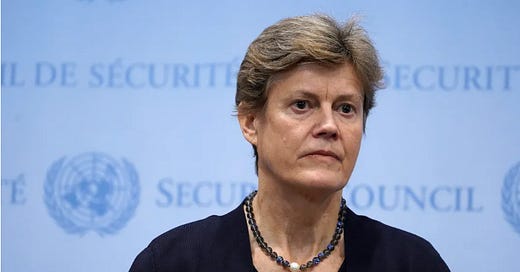United Kingdom: Dame Barbara Woodward Poised to Become MI6's First Female Chief
The United Kingdom is on the cusp of making history as Dame Barbara Woodward, a seasoned diplomat and former ambassador to China, is widely tipped to become the first woman to lead the Secret Intelligence Service (MI6). This groundbreaking appointment would not only shatter a century-old glass ceiling within Britain's espionage apparatus but also reflect the shifting dynamics of global intelligence leadership. However, the choice is not without controversy.
Who Is Dame Barbara Woodward?
Dame Barbara Woodward, 63, is currently the UK's Permanent Representative to the United Nations. Her career in diplomacy spans decades, having held posts in Moscow and Beijing, and culminating in her appointment as the UK's ambassador to China from 2015 to 2020. She is one of the Foreign Office's most senior and experienced officials, known for her composure, intellect, and extensive knowledge of international relations.
Woodward was educated at St Andrews and Yale and joined the Foreign Office in 1994. She has earned a reputation for professionalism and discretion, qualities deemed essential in the world of intelligence. Her tenure in China, however, has attracted both praise and criticism.
The "Beijing Barbara" Label
Within certain political circles, particularly among China hawks in Westminster, Dame Barbara has earned the nickname "Beijing Barbara." Critics argue that during her time as ambassador, she was too conciliatory towards the Chinese Communist Party (CCP), failing to challenge Beijing robustly on issues like human rights abuses in Xinjiang and the erosion of freedoms in Hong Kong.
Former Conservative Party leader Sir Iain Duncan Smith has been particularly vocal, warning that her approach could signal a soft stance on China at a time when UK intelligence agencies are increasingly prioritising counter-espionage efforts against Beijing. Concerns have also been raised about potential vulnerabilities in UK infrastructure, with reports of Chinese-made technologies embedded in sensitive sectors.
Supporters of Woodward counter that diplomacy requires nuance, and that her experience navigating the complexities of UK-China relations positions her well to understand and counter Chinese espionage efforts from the inside.
The MI6 Leadership Role
The head of MI6, traditionally referred to by the codename "C," leads Britain's most secretive intelligence service, responsible for gathering foreign intelligence, managing covert operations, and advising the government on threats to national security. Since its formal establishment in 1909, the position has been held exclusively by men, often from elite educational and military backgrounds.
Woodward's appointment would mark a seismic shift in this tradition, sending a powerful message about the diversification of British intelligence leadership. It also reflects a broader trend across Western intelligence communities, where women are increasingly rising to top roles, such as Avril Haines in the United States.
A Deliberate Selection Process
According to sources familiar with the process, the competition for the MI6 role was unusually inclusive, with three women reportedly shortlisted. The final recommendation rests with the Prime Minister, following advice from the Foreign Secretary and National Security Adviser. While no official confirmation has been issued by Downing Street, senior insiders suggest Woodward is the frontrunner.
This deliberate and historic selection process underlines an institutional recognition that leadership in modern intelligence agencies must evolve. Intelligence today is as much about cyber threats, geopolitical influence, and hybrid warfare as it is about traditional espionage. Woodward's global diplomatic experience may prove a strategic asset.
The China Factor
China represents one of the greatest strategic challenges to Western intelligence in the 21st century. British agencies have publicly acknowledged that Beijing engages in aggressive cyber-espionage, political influence operations, and economic coercion. MI6, under its next chief, will play a central role in countering these activities.
This is where concerns about Woodward's record come into sharper focus. Her critics argue that her diplomatic posture in Beijing lacked the aggression needed to confront a rising authoritarian superpower. However, others argue that her direct experience of the Chinese state’s inner workings provides her with unparalleled insight into its intelligence strategies.
Her defenders note that diplomacy and intelligence often operate under different constraints and that Woodward's understanding of the subtleties of Chinese power projection could make her exceptionally effective in counterintelligence planning.
Strategic Challenges Ahead
Should Woodward assume the MI6 post, she will inherit a complex security environment:
Cyber Warfare: MI6 must bolster its cyber operations to address threats from state and non-state actors.
Russian Hostility: The ongoing confrontation with Russia over Ukraine and hybrid warfare tactics remains a priority.
Terrorism: Though eclipsed by state threats, radical extremism and terrorism continue to pose risks.
Artificial Intelligence: The future of intelligence collection and analysis is rapidly being transformed by AI, demanding strategic innovation.
Alliances: Maintaining intelligence-sharing partnerships, particularly within the Five Eyes alliance, will remain essential.
Each of these areas will require not only operational oversight but also visionary leadership. Whether Woodward’s skills are a match for these demands will be the subject of much scrutiny.
Institutional Reforms and Public Perception
Beyond operational challenges, MI6 has been gradually modernising its image. It has taken cautious steps towards transparency, digital outreach, and diversity. Having a woman at the helm would align with this evolution and could enhance MI6's image as a modern intelligence service fit for the 21st century.
Public trust in intelligence institutions is critical, especially in an age of mass surveillance concerns, data privacy debates, and rising populist suspicion of government agencies. Woodward’s diplomatic finesse might serve as a useful bridge between a secretive institution and an increasingly watchful public.
SOURCE: Osint




